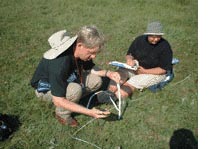 Employee
Involvement in Conservation
Introduction
According to a recent survey in Britain, around 22 million people
volunteer in their local community each year (The Complete Beginners
Guide for Companies who wish to start an employee volunteering scheme,
Employee Volunteering). A large proportion of these volunteers support
local conservation; for example, every year more than 24,600 volunteers
give their support to The Wildlife Trusts.
An increasing number of conservation initiatives are supported
by employers, which recognise the benefits of employee involvement
in community based conservation activities for companies. For example
Investing
in Nature, a five-year partnership between Earthwatch, HSBC,
WWF and Botanic Gardens Conservation International (BGCI), is working
to place 2, 000 HSBC employees on Earthwatch Conservation projects
around the world and initiate local community conservation projects
back in employees own communities.
What is Employee Engagement?
Employee engagement refers to a wide range of ways in which employees
can become involved in voluntary initiatives. These initiatives
involve a three way partnership between the employer, employee and
the volunteer organisation. In the conservation sector these organisations
will usually be non-governmental organisations or local biodiversity
partnerships.
The work arrangements and activities can vary widely. In some cases
staff volunteer their time outside of work hours to carry out conservation
work in the communities. In other cases a company may second employees
to work full time in the recipient organisation for six months or
a year. For more details of ways in which companies may choose to
encourage employee engagement see Taking Action
below.
Employee engagement schemes contribute to the skills, resources
and work of these organisations while providing satisfying and motivating
opportunity for employees to gain valuable knowledge, skills, and
new ideas which can in turn be beneficial to the company.
The Business Case
Employee engagement in biodiversity conservation offers numerous
opportunities and benefits to businesses. Engage
Online, a programme which supports the development of employee
engagement in community initiatives, has presented the business
case for employee engagement by citing many of these benefits which
include:
1. By supporting employee engagement in conservation activities
companies can demonstrate their own commitment to building healthy
communities and biodiversity issues,
2. A wide range of skills can be developed through employee engagement
such as communications, organisation time management, and innovative
approaches to problem solving and teamwork
3. Encouraging new ways of thinking can help internal communication
within an organisation by creating a shared sense of purpose and
loyalty, and provide staffs with new insights and knowledge that
encourage innovation both in the community and within the company.
4. Employee engagement is associated with corporate social responsibility
and enhancing company’s image.
5. Companies can benefit from broadening their networking capacity
within the community through their employees involvement in local
initiatives. This can help the company keep abreast of current environmental
and community issues.
Benefits for Employees
In addition to benefits to the company, employee engagement in
conservation activities offers many opportunities to employees:
1. Building and strengthening personal skills such as communication
and organisational skills.
2. Exploring and learning to cope with new situations and challenges.
3. Working with a wide range of different people from other departments
or organisaitons.
4. Offering the opportunity to employees to contribute to important
conservation causes.
5. Providing an atmosphere of a caring employer who is good to work
with.
These benefits will have positive payback to the company through
increased motivation, morale and potentially productivity of employees.
Taking Action
Numerous different employee engagement programmes have been developed
in recent years. Employee engagement schemes will either be company
or employee led. In company led schemes, the employer will lead
on setting up a specific programme, for instance offering staff
the chance to become involved in a ‘fellowship’ through
a particular organisation or through secondments.
For many companies wishing to increase their internal understanding
of biodiversity and environmental issues, sponsoring their employees
to participate in short-term conservation projects can provide many
benefits to companies, communities and employees.
The
Earthwatch Corporate Employee Fellowships are designed to develop
environmental awareness and understanding amongst corporate employees
by involving them in hands-on scientific field research projects.
Employees on Earthwatch Fellowships contribute to internationally
important conservation work such as monitoring endangered flamingos’
numbers in Kenya, conserving dolphin population off southern Spain
and tracking pumas in Mexico to help maintain viable populations.
For many fellows, the experience provides an opportunity to develop
new skills, meet new people from around the world, learn about important
conservation issues and develop the motivation to continue making
positive contribution to the environment when they return home.
To view a range of local environmental activities undertaken by
volunteers on their return home from Earthwatch research project
please visit a regularly updated list of Local
Action Updates.
Secondments are a way for employees to gain in depth knowledge of
the conservation sector while providing the receiving organisation
with valuable business skills such as finance, project management
or information technology. To see a case study, please click here.

Other employer led initiatives exist where a company’s work
with a conservation organisation provides opportunities for employees
to become actively involved in conservation initiatives. Employees
can contribute to assessing and monitoring biodiversity as well
as with practical tasks such as hedge laying or pond management.
Case Study: At Quest, a subsidiary of ICI in Kent, employees and
their families have taken part in tree planting days on the company’s
site. The work contributes to the conservation management plan which
the company has compiled with the help of the Kentish Stour
Countryside Project.
Case Study: At the John
Muir Trust Project at Schiehallion, BP employees regularly participate
in footpath maintenance, stile building and environmental surveys
designed to repair erosion and help conserve this popular mountain
in Perthshire, Scotland. The company matches the employees time
with resources and funds donated to the John Muir Trust. Employees
participating in the Project come away with the satisfaction of
a fun weekend outdoors, a sense of achievement and a wider understanding
of the environment.
Other programmes are supported by companies but organised by the
employees themselves. For instance, many companies offer their staff
a week’s paid leave to carry out volunteer work or may contribute
to a volunteer’s efforts through matching their time with
funds.
Useful organisations which can help companies set up employee engagement
initiatives include Earthwatch
Institute (Europe), Business
in the Community, and the Employee
Volunteering Programme, which is managed by the National Trust
but also provides opportunities for employee volunteering with British
Trust for Conservation Volunteers, RSPB, The Wildlife Trust and
YHA.
These institutions have a good understanding of local community
needs and can organise entire programmes of activities and events,
thus reducing the time a company has to spend in planning and setting
these up itself.
Resources
 Organisations Organisations
There are several charity organisations which give employees the
opportunity to become involved with practical conservation work
and get a real hands-on experience in the UK and worldwide.
The
Earthwatch Corporate Employee Fellowships are designed to develop
environmental awareness and understanding amongst corporate employees
by involving them in hands-on scientific field research projects.
British Trust for
Conservation Volunteering (BTCV) offers opportunities for practical
conservation volunteering in the UK. Projects range form dry-stone
walling fencing to pond recreation and habitat management.
Business in the
Community (BITC): a membership organisation which gives advice
on all areas of CSR. Business in the Community’s Advisory
Service provides companies with assistance in shaping corporate
responsibility policies, practices and impact. They can also provide
advice, information, and support on all aspects of employee community
involvement like events and seminars and designing employee volunteering
programmes.
ENGAGE
Online is a programme developed by the International Business
Leader Forum (IBLF) and Business in the Community (BITC) to support
companies and communities in their effort to develop employee engagement
as a tool to build healthy and sustainable communities.
The
National Trust’s Employee Volunteering Programme (EVP)
is working in partnership with BTCV, RSPB, The Wildlife Trusts,
and YHA to develop employee volunteering projects for groups and
individuals.
The Royal
Society for Protection of Birds (RSBP) is UK charity working
to secure a healthy environment for birds and wildlife. To see volunteering
opportunities at RSBP click here. .
Youth
Hostel Accommodation (YHA) gives volunteers the opportunity
to get involved in a wide range of activities, like volunteering
wardening, countryside activities, marketing and professional services.
Publications
Business in the Community, Responsibility:
driving innovation, inspiring employees, FastForward Research 2003.
The
Business case for Employee Involvement, 2003, Business in the
Community, sponsored by Barclays.
Ramrayka, Liza, Employee
Volunteering –The Guide,2001, National Centre for Volunteering
Practical Handbook
for Conservation Volunteering, BTCV.
The
Complete Beginners Guide for Companies who wish to start an employee
volunteering scheme, Employee Volunteering.
2001 Home Office Citizenship Survey, ‘Active Communities’.
For a copy contact Meta Zimmeck, Voluntary and Community Research
Section, Home Office, London. Tel. 020 7273 2261
 Links Links
Employee
Volunteering
Time Bank
World
Wide Volunteering
Volunteering
England
The
Experience Corp
www.do-it.org.uk
Photo Credits: Elizabeth
Brill, Ed Wilson / Earthwatch Institute,
Stella Johnson / Earthwatch Institute,
Peter Mbugua/Diageo, Michelle Hamer
/ Dai Herbert, Philip Swann / HSBC.
|




